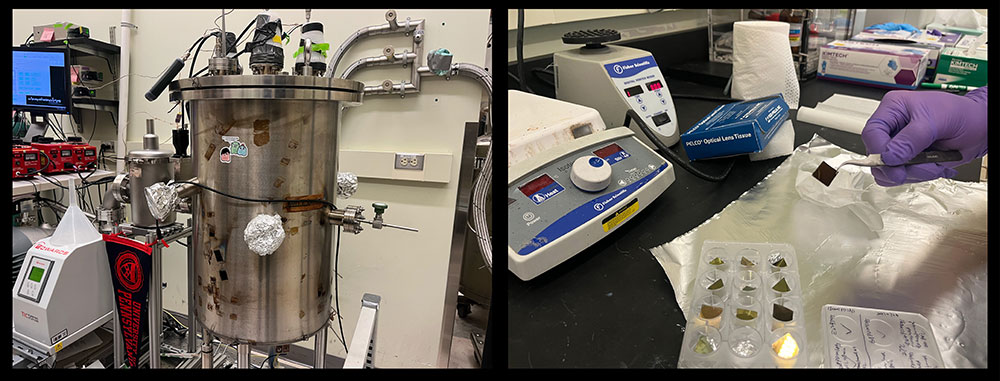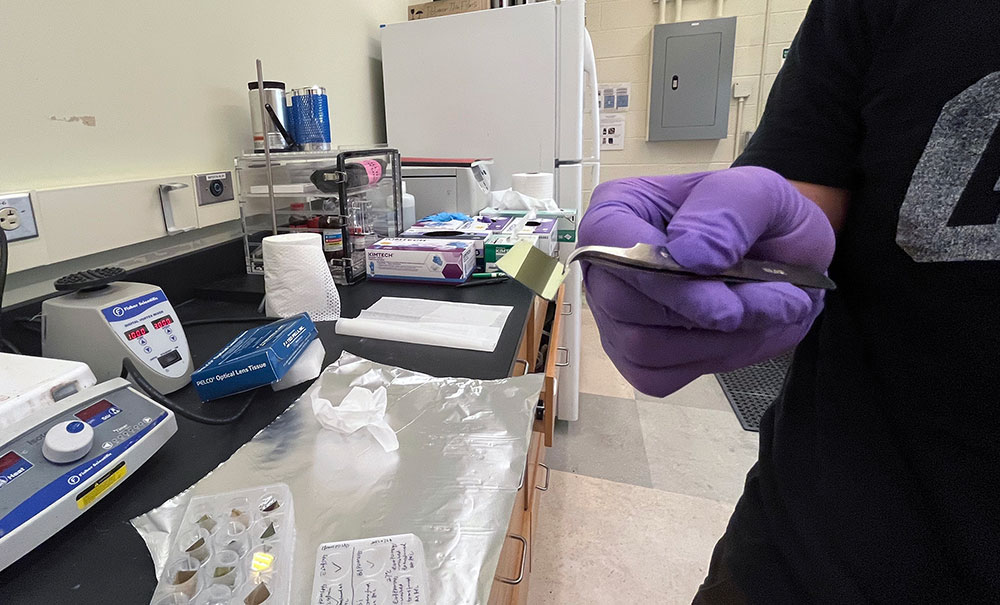Soft Support Can Make Unexpectedly Stable Glass
A team of researchers from Penn and the Brookhaven National Laboratory find a new way to manufacture stable glass.
April 12, 2024
By Nathi Magubane
Editor's note: The following feature story was originally issued by the University of Pennsylvania (Penn). Researchers from Penn and the National Synchrotron Light Source II (NSLS-II), a U.S. Department of Energy (DOE) Office of Science User Facility at DOE’s Brookhaven National Laboratory, used the Soft Matter Interfaces (SMI) beamline to characterize the structure of high-density stable glasses using grazing incidence wide angle X-ray scattering, one of the beamline’s flagship techniques. An analysis package developed at the beamline facilitated the quantification of the molecular orientation of the glass. For more information on Brookhaven’s role in this research, contact Denise Yazak (dyazak@bnl.gov, 631-344-6371).
Glasses are ubiquitous materials found in building materials, beverage containers, soft electronics, and mobile phone screens, and the creation of naturally dense and rigid glass occurs through a process known as aging. It involves a slow transformation that can take place over millennia to hundreds of millions of years and is marked by the gradual densification and rigidification of a liquid cooled below its melting point.
However, in 2007 researchers found that stable glasses can also be produced by condensing the material from the vapor phase, using a process called physical vapor deposition. Vapor deposition allows molecules that have just arrived at the surface to pack better, producing better-aged glasses.
Now, a team of researchers led by Zahra Fakhraai of the University of Pennsylvania’s School of Arts & Sciences, in collaboration with scientists at the Brookhaven National Laboratory, have discovered a method to further expedite this aging process, redefining the fundamental principles that have guided the formation of stable glass. Their findings were published in the journal Nature Materials.
“What we discovered, rather paradoxically, is that, by using a soft, more flexible substrate during our vapor deposition process, we can make more rigid and denser glasses than previously made,” Fakhraai says. “These findings offer a new way to precisely engineer glass films and pave the way for making durable materials much faster.”
The discovery came about serendipitously when Peng Luo, a postdoctoral researcher in the Fakhraai Group, was encouraged to experiment with soft substrates for glass deposition, primarily as a curiosity, “to see if softer substrates would cause damage to the material,” he says. “But what we saw was glass that exhibited properties as if it aged for many millions of years, far exceeding what can be seen on methods using traditional rigid substrates.”
 enlarge
enlarge
Nicknamed "Defiant," the Fakhraai Group's custom-made ultra-high vacuum chamber (left) is used for physical vapor deposition of organic glasses. Image on the right is of 180 nm thick stable glass films of N,N'-bis(3-methylphenyl)-N,N'-diphenylbenzidine, deposited on polydimethylsiloxane-coated silicon wafer. (Image: Courtesy of Nathi Magubane)
Luo explains that prior studies used deposition rate and substrate temperature to control the assembly of the surface molecules after they land on the substrate, and that at appropriate temperatures, the slower the rate of deposition, the more time the landed molecules will have to adjust themselves towards a more stable structure before they become buried and “frozen” by the incoming molecules.
“It’s basically a “self-assembly” of the surface molecules in a way determined by their own mobility at a certain temperature, and we don’t have all that much control over how slow we can deposit,” he says. “Our finding that a soft substrate can make the deposited glass film denser indicates that substrate elasticity can affect the assembly process of the surface molecules, and, therefore, this can be used as a new dimension to control the structure and properties of glass films in a much larger range which was not accessible before.”
By deploying soft substrates such as polydimethylsiloxane, the team showed that it is possible to significantly accelerate stable glass formation, crafting a material with a 2-2.5% higher density than conventional liquid-quenched glasses and as much as 1% larger than any other reported stable glass.
Luo adds that another noteworthy finding is that the molecule they deposited is only a nanometer in length; however, during deposition the surface equilibrium processes can be affected by the soft substrate over a considerable distance, measured to be about 200 nanometers. This distance is notable because it far exceeds what would be expected based on current glass theories, presenting a challenge to existing understanding.
“This effect can be likened to playing a game of telephone in an auditorium packed with 200 people but somehow, quite mysteriously, the message is communicated perfectly without disruption” Fakhraai says. “The soft substrate’s influence over such a large distance suggests a form of long-range communication or interaction on the surface, which is not fully understood and something we’re interested in exploring in future research.”
Zahra Fakhraai is a professor in the Department of Chemistry in the School of Arts & Sciences at the University of Pennsylvania.
Peng Luo is a postdoctoral researcher in the Fakhraai Group at Penn.
Other authors are Shivajee Govind, Richard B. Stephens, Dong Hyup. Kim, Cindy Y. Chen, and Truc Nguyen of Penn Arts & Sciences; Brandon Mcclimon of Penn’s School of Engineering and Applied Science; Sarah E. Wolf of the State University of New York at Cortland; and Patryk Wasik and Mikhail Zhernenkov of the Brookhaven National Laboratory.
The research was supported by the National Science Foundation (grants DMR-1720530, DMR-2309000 and DMR-2309043 and Graduate Research Fellowship Program DGE-1845298) and the U.S. Department of Energy (DE-SC0012704).
2024-21835 | INT/EXT | Newsroom










